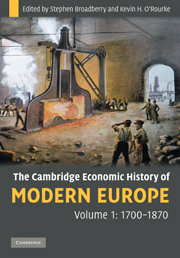Book contents
10 - Urbanization
Published online by Cambridge University Press: 05 August 2012
Summary
The nineteenth century marks the passage of Europe from a civilization based on agriculture and the countryside to a civilization based on industry, services, and cities. Urbanization was one of the main changes taking place during the modernization of the last two centuries.
In the past, a dualistic economy and society prevailed, and the urban and rural worlds were two deeply different spheres from both a social and an economic viewpoint. In the countryside family ties and integration in village and community formed the basis of human relationships. In the cities, by contrast, relations prevailed among individuals cooperating within a wider system of social and economic contacts and exchanges. Innovation and technical change characterized cities, while stability and tradition were the hallmarks of the countryside.
From Max Weber onwards Western urban centers have frequently been defined as “producer cities,” distinguishing them from ancient and non-Western cities which have often been labelled as “consumer cities.” This distinction, however, does not correspond to reality – production and consumption are intertwined features of any city. In pre-modern European capital cities, centered on the court and the associated bureaucracy, there was a need for services, which are also productive activities. Early modern European cities offered a wider range of employment opportunities and thereby attracted people from the countryside.
- Type
- Chapter
- Information
- The Cambridge Economic History of Modern Europe , pp. 235 - 263Publisher: Cambridge University PressPrint publication year: 2010



